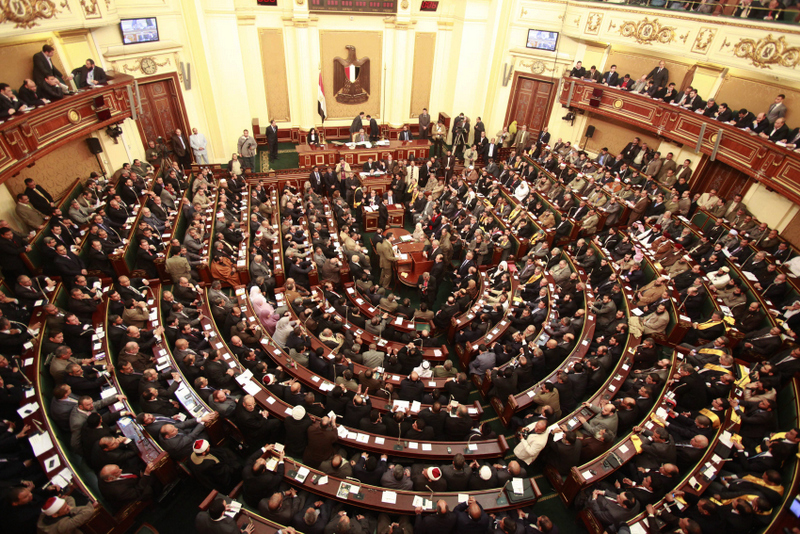
Why does the state insist on repeating history and losing the same old battles it has lost before, and will continue to lose so long as its aim is to suppress freedom?
History does not repeat itself except in an undeveloped country and a run-down society. Despite everything we’ve gone through, we have a youth that is aware and rejects any authoritarian actions that ultimately aim at suppressing freedom and killing all attempts of living in a democratic atmosphere, which we hope to achieve one day.
History has no mercy on those who did not do any good for the country, in actions or words. It now has more power to document everything we do through huge technological advancement. Thus, everything you do, irrespective of your social position, will be recorded.
The draft terrorism law, presented by the State Council, is shameful in every line and single letter written. If the law is applied, it will be a form of terrorism in itself, and a shame to Egypt with all its bodies, which seek to undermine the limited freedom we have achieved, and punish the Egyptian media for searching for the truth even if it made mistakes.
I do not intend to talk about flaws in the law; I am talking about the bad intentions of those who are pushing for it, whether from inside or outside the regime, or those who find every chance to applaud the government in hopes that it sympathises with them. I even mean those who timidly oppose the law; those will be the first affected by the law once it is in force.
In the criminal law, we have many articles addressing sentences in terrorism cases, so we do not need a new law that aims at giving the government a guillotine for anyone in its opposition.
In any international regime, the opposition groups are the ones who create the balance for the people, especially as we are in modern times, and whoever rules is chosen by the people. As such, we cannot hunt down the opposition through the law, an act which we can describe as having Nazi tendencies, at the very least. How can you give officials the authority to use force or arrest those whom are deemed “terrorists”, or those who are simply suspected of belonging to a terrorist group? What are the determinants and restrictions on the security forces to ensure that they do not use excessive force?
I do not understand those who opposed popular opinion, which rejects the law, and have decided instead to flatter authority, which will by all means leave once its term is over. Even if we assume good intentions now, how can we assume it for future rulers?
Abolishing the emergency law was one of the greatest achievements for the Egyptian people. Why would we reinstate it in a different form, with laws even harsher than those of the emergency law?
What has changed and made it necessary to apply this shameful law now? The media has been failing and succeeding for ages. Terrorists are expanding their militias all the time. Those who are arrested by the state for committing acts of terror are tried by the law and are given death sentences. Those who commit acts that pose a threat to the public security are referred to the courts, and are given their sentence in accordance with their criminal acts, without bias to anyone.
What pushed us to take this action now? Why do we take such actions every time we forget the West’s criticism of our lack of freedom? Why does it always seem like we’re fighting against those who dream of a free life at home and those who are watching over our every mistake from outside?
We have reached a level political incompetence that places the Egyptian regime under international scrutiny at all times. This is surely affecting the targeted investments and the economic conditions, which are now at their worse.
If the state targets the Muslim Brotherhood and their people, who adhere to political Islam, their actions, on the security and legal level, do not require a new law to address them. We have to think of the future of the relationship between the state and the Brotherhood, whether a law has been put into force or not.
So as not to be misunderstood, it’s worth explaining that despite the length of confrontations between the state and the Brotherhood, they will eventually end up in “reconciliation, liquidation, prison, etc”, and the experiences in the eras of Abdel Nasser, Sadat, and Mubarak are lessons and warnings to us.
The law that is set to be approved is one of the worst laws, and it disregards all the gains obtained and hoped for, placing a question mark over the intentions of the regime and the relationship between the people and their security system. In fact, it’s an indicator of the state’s breaking of promises made to the people to provide a life of dignity, freedom and social justice.
The confrontation is now much more difficult because some people are supporting the state in the face of the people in order to gain personal benefits. But I’m convinced that the battles for freedom – no matter their length – always end in favour of those who will not bow down to terrorism, even if it comes in a legal guise.
Emad El-Sayed is an Egyptian journalist and the Editor of Daily News Egypt.



